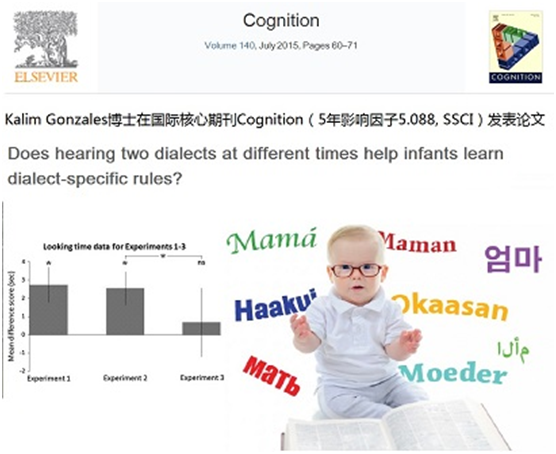Doctor Kalim Gonzales, the first foreign “Yun Shan Scholar” at GDUFS, published his paper “Does hearing two dialects at different times help infants learn dialect-specific rules?” on Cognition (SSCI, IF 5.088). He is also the researcher of the Foreign Linguistics and Applied Linguistics Center. Through his research about the second language of babies, Dr. Gonzales discovered that acquiring two different languages during different time is more beneficial to acquire specific linguistic rules. This result marks that case that our foreign linguistics and applied linguistics studies have extended the research field dramatically, as well as made a significant breakthrough.
Children who grow in multi-lingual environment, receiving different languages input, accordingly, grasp the various linguistic rules. So, how do children acquire the rules of input languages in this complicated linguistic environment? In order to look into this question, Dr. Gonzales and his cooperators Professor LouAnn Gerken and Professor Rebecca Gomez allowed 12-month-old babies to listen to an artificial language designed by researchers. During the experimentation, there are two flows of languages representing different dialects. One refers to “Pure Phonetic Flow” concerning rules of aXbY. However, another “Mixed Phonetic Flow” doesn’t have such rules. Researchers played the material (2 types of phonetic flow) to babies in a quiet room through speaker. Babies were allocated into two experimental conditions randomly: One condition was under the fast speed of the shifting between pure phonetic flow and the mixed one. Another one is at a slow speed of shifting. Researchers found that only when the slow speed is used that babies are more likely to acquire the phonetic rules of pure phonetic flow. This result indicates that during different periods, these two types of languages or dialects might be helpful for babies to acquire specific languages or dialects. The author reckons that this phenomenon accounts for the limited memories of babies: when two languages or dialects present during different period, it is almost impossible to combine them in memories.
Dr. Gonzales graduated from University of Arizona in 2013. In October of the same year, he worked as the first foreign Yun Shan scholar in GDUFS. He also acted as the full-time researcher of the Foreign Linguistics and Applied Linguistics Center. At present, he is mainly engaging in language processing of babies and linguistics.

It is learned that the researchers from the Foreign Linguistics and Applied Linguistics Center of GDUFS have published several papers on SSCI and SCI. For instance, Brain and Language (ranked the second of international language category, IF 3.3), PLOS ONE (SCI, IF 3.5), Applied Linguistics (ranked the fifth of international language category, IF 2.21), International Journal of Lexicography, Bilingualism: Language and Cognition, Journal of Neurolinguistics,Journal of Pragmatics, Journal of Cognitive Psychology, Language and Linguistics, Discourse Studies and so on.

